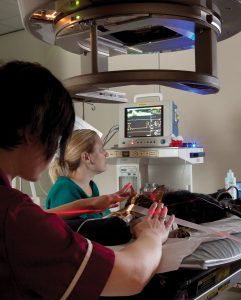
Radiotherapy for your pet
A guide to radiotherapy and the veterinary patient
What is radiotherapy?
Ionising radiation is targeted at cancer cells to disrupt their ability to divide, so when they come to divide, they die. Ionising radiation is usually given in the form of powerful X-rays produced by a machine called a Linear Accelerator.
How does radiotherapy work?
Cancer cells generally multiply and grow very rapidly. Ionising radiation works primarily by disrupting the process of cell division; as the cells try to multiply, they die. Radiotherapy is a focused treatment and the goal is to provide local or regional control of cancer.
Radiotherapy is rarely used for cancer that has spread throughout the body, although in some cases, this may be possible.
What are the benefits of radiotherapy?
Radiation treatments are given by specially trained veterinary surgeons using dedicated equipment that is only available at a few locations throughout Europe. Radiation treatments are individualised for each patient and are sometimes incorporated into a treatment plan involving other types of cancer therapy, ie surgery or chemotherapy.
Radiotherapy can be used to ‘clean up’ residual cancer cells that have been left behind after surgery. These cancers are often located on the legs or head of the patient, making it difficult for the surgeon to remove all the cancer. Examples when radiotherapy is used in this manner are mast cell tumours or soft tissue sarcomas.
Radiotherapy can be used as the only treatment. In some cases, the cancer will go away with radiotherapy alone, certain types of isolated lymphoma can be treated in this way. In other cases, the cancer cannot be reached (or accessed) in any other way and radiotherapy can be used to shrink the cancer to improve the quality of life for the patient. Examples of such cancers are some brain tumours.
Radiotherapy can be used to shrink large tumours that are too big to be removed surgically. In some cases, just shrinking a tumour can provide pain relief and improve quality of life. We use radiation to shrink large sarcomas, which enables us to carry out surgery afterwards.
Radiotherapy can be used as a palliative procedure to relieve cancer pain. An example of such a cancer is the malignant bone tumour, osteosarcoma. However, it is important to point out that not all patients are candidates for this treatment.
Radiotherapy is sometimes combined with chemotherapy in an attempt to kill as many cancer cells as possible. Certain patients with mast cell tumours are given this combination of treatment.

How is treatment given?
Radiotherapy is usually an out-patient treatment. It is vital that the patient is perfectly still whilst the radiotherapy is being administered, which means that a short anaesthetic is required for each treatment.
Once the patient is positioned, the treatment only takes a few minutes and they can go home when they are awake. To aid positioning, localisation marks are often put on the skin, which does mean that some patients will need to be shaved, whilst others have lines painted on their skin.
What are the side effects?
Dogs and cats generally tolerate radiotherapy very well. However, there is the possibility of side effects because some normal tissue is exposed to radiation:
Burns
The most common side effect seen during or immediately after treatment is skin burn. This is like mild sunburn and will rapidly resolve, providing the instructions given by the attending clinician are followed. The most important thing to prevent problems is to stop any licking and this may be achieved using a buster collar or placement of a light wrap over the treatment site. Sometimes it is necessary to apply a steroid ointment to reduce any inflammation. Patients requiring radiotherapy on the lower part of the leg are most likely to experience some burns.
Hair Loss
The hair will fall out in the treatment area. In some cases, the colour of the skin will change, resulting in a black patch of skin. Usually (but not always), the hair will grow back a few months after completing treatment. When the hair grows back, it is always white.
Other side effects may be seen, depending on the type and location of the cancer being irradiated. Your radiation Oncologist will discuss any potential individual side effects with you at your consultation.
Is radiotherapy expensive?
Treatment of cancer with radiotherapy can be expensive. It involves the use of very sophisticated equipment that is only available in a few centres throughout Europe (we are one of only six veterinary centres in the UK to have this equipment).
In addition, your pet will benefit from the expertise of highly trained Specialists in veterinary oncology, together with an experienced support team who are available 24 hours a day, if necessary. The exact cost of the treatment depends upon the type of cancer, the goal of the treatment, the number of treatments required, and if any other treatment is indicated (eg surgery or chemotherapy). The projected cost will be discussed with you at your consultation.
Will treatment be covered by my insurance?
Radiation is the recognised, state-of-the-art treatment for many cancers and if you have insurance, treatment should be covered. However, we recommend that you check your policy carefully before starting any therapy and if you have any doubts, you should check with your individual insurance provider. You are responsible for payment for all treatments.
What happens if my dog/cat is sick out of hours?
Southfields Veterinary Specialists is a 24-hour facility – if you have a problem, please call 01268 564664 and speak to the out of hours team who will be happy to help you. It may be necessary for you to bring your pet in, and in some cases, we may need to admit them for further tests and/or treatment. Under no circumstances should you delay calling us if you have any concerns regarding the well-being of your pet.
What happens when treatment is completed?
Once a course of treatment is completed, your Oncology Specialist will discuss monitoring and follow-up appointments.
Will my pet have a normal life whilst undergoing radiotherapy?
This is an extremely important question as the goal of radiotherapy is to improve and extend the quality of life for the patient for as long as possible. Usually our patients have little or no problem with treatment, but some burning of the skin may occur causing short-term discomfort. If, at any time, you feel this goal is not being achieved, you should discuss this with your Oncology Specialist at the earliest opportunity.